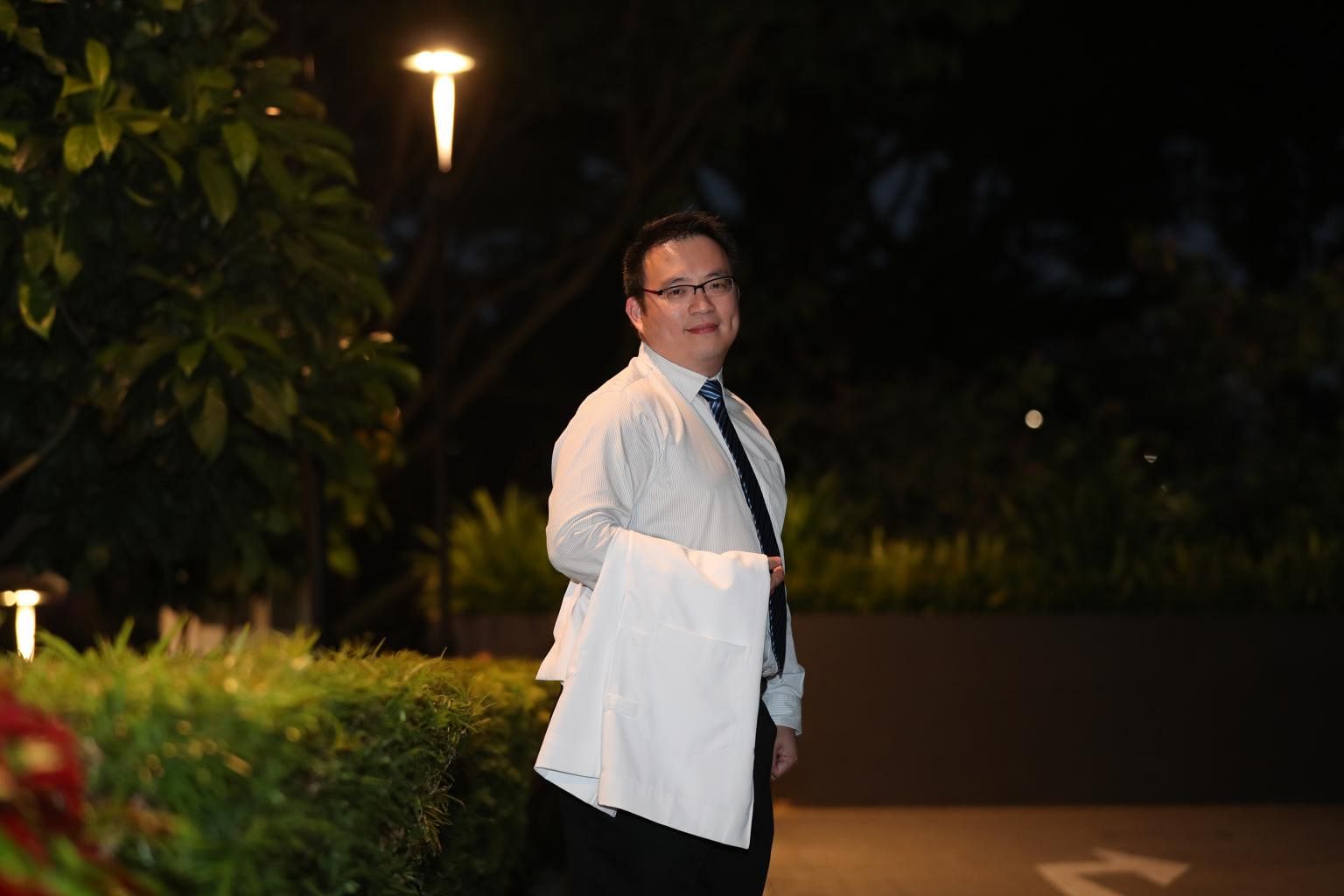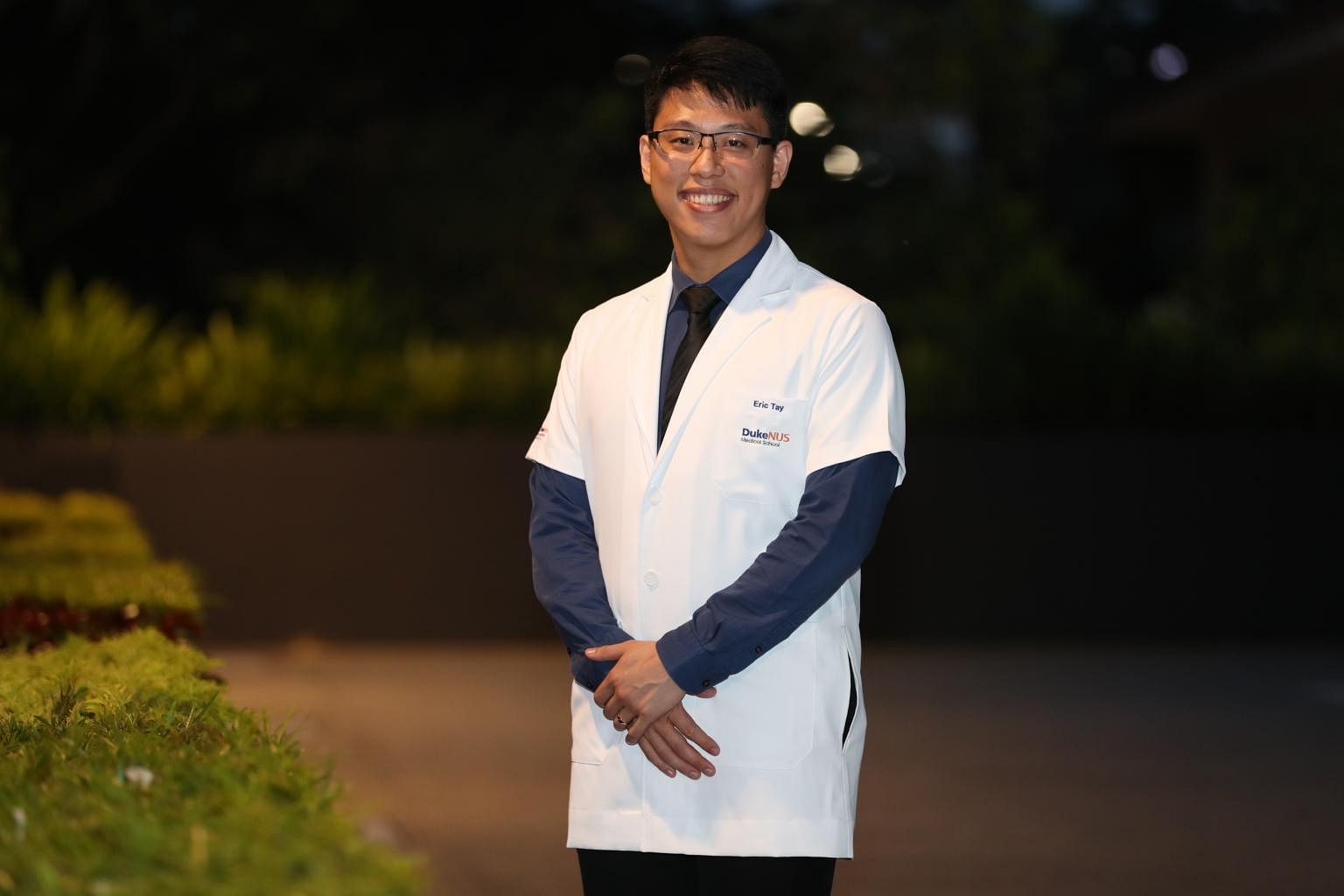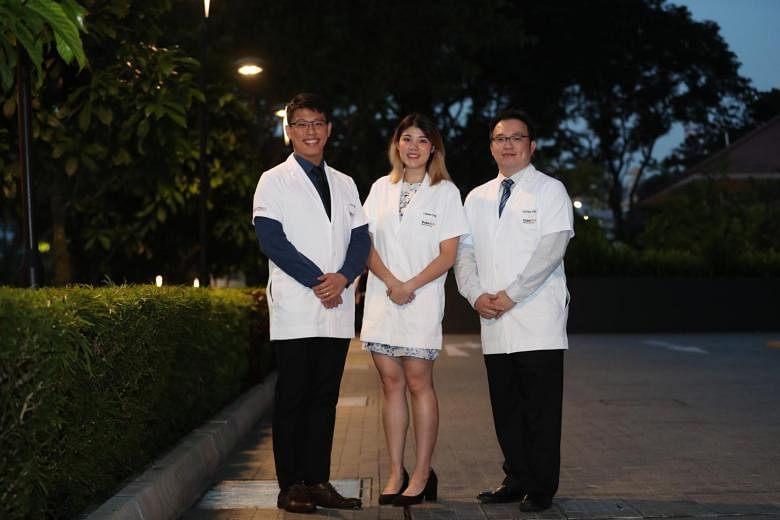SINGAPORE - Becoming a doctor is traditionally associated with long, demanding years in medical school.
So what does it take to change careers in order to enter medical school as a mature student?
At Duke-NUS Medical School, Singapore's only graduate medical school, the majority of students are Singaporeans around the age of 25 who have an undergraduate science degree, says its dean, Professor Thomas Coffman.
The National University of Singapore and Nanyang Technological University each has an undergraduate medical school. All three institutions held their White Coat Ceremony, a robing ritual for first-year medical students, earlier this month.
Duke-NUS' first medical degree programme started in 2007 and its Doctor of Medicine programme lasts four years.
The Straits Times interviewed some Duke-NUS freshmen who are older than many in their cohort. They came to medical school via roundabout paths after investing years in other careers.
One of these freshmen, Mr Lim Chun Chai, 39, is sure the sacrifice will be worth it.
"Every waking moment, I feel like I have to juggle my various work and family commitments. But I'm enthusiastic and very determined," he says.
The ex-banker
At 39, Mr Lim Chun Chai is Duke-NUS Medical School's oldest ever first-year student.
The former vice-president at OCBC Bank quit his job after about nine years at the bank, where he was responsible for corporate loans.
He had switched careers before - from manufacturing to banking but this time, he had a young family to consider. His wife, also 39, runs an art enrichment business. They have been married for 13 years and have a son, five, and a daughter, three.
Becoming a doctor was a dream that coalesced only in the last two years. After his A levels, he took a government scholarship to study mechanical engineering at Cornell University in New York.
"I didn't know what I wanted to do at that time," he says.

After graduating, he joined the manufacturing industry. When he turned 30, he wanted to leave the multinational firm where he had been working for a few years, for a career with more stability, especially since he had seen employees being laid off in his firm. He did not have children then.
Prospects were better in banking, he felt, so he applied for an OCBC programme that facilitated his mid-career switch. "But two years ago, I started asking myself what I wanted out of life," he says.
Although banking afforded him a comfortable lifestyle, he says his wish is to help others. He had been exposed to volunteer activities as part of the bank's corporate social responsibility programme and found them satisfying.
Besides, he adds, being a doctor is a "very respectable" profession. Making this career change was harder as Mr Lim now had a family.
It was an ex-boss who helped him make up his mind. "She said, if you want to help people, you cannot focus only on your family," he says.
Her words helped him reconcile himself to the wider purpose of being a doctor, even if it meant he would have less time for his family.
He took a bursary at Duke-NUS and is thinking of specialising in geriatric medicine, in view of the impending "silver tsunami" in an ageing Singapore, he says.
Besides the demanding hours of the course, he says: "One challenge is how to have the right attitude of mutual respect and a willingness to learn. There are hospital consultants younger than me. (I wouldn't want) my life experience to get in the way of my learning," he says.
But he is sure about his decision.
"Now, I know I want this, as opposed to just moving along (in the past)," he adds.
The former journalist
Former journalist Lisabel Ting, 30, says she was facing a "quarter-life crisis" before she took the leap into medical school.
Her childhood ambition was to be a National Geographic writer and she worked at Singapore Press Holdings for more than five years, including reporting on the arts and later, technology at The Straits Times.
She has a psychology degree and a master's in advanced neuroimaging from University College London.
About two years ago, months before her six-year scholarship bond with SPH was to end, Ms Ting, then a multimedia journalist, came across a business opportunity. She was offered the chance to own part of a technology and gaming channel, SGeek.
The opportunity was too good to pass up and she broke her bond and became co-founder of SGeek, which was launched by social media agency SGAG last year.
Her 31-year-old husband runs a business in the gaming industry. The couple have no children.
But even as she relished being her "own boss", she was thinking about medical school - something that had always been on her mind.
"I wanted something that I felt had higher impact and medicine had that for me," she says.

In 2017, when she was still with SPH, she took the Medical College Admission Test, part of the admissions process at Duke-NUS Medical School - using her lunch breaks and annual leave to study.
Her results were good but she got cold feet. Although she was drawn to medicine, she was "terrified" at the idea of becoming a doctor and decided to put it on hold.
"I was so scared I would fail as a doctor. It's a four-year course and such a big commitment. There was a high chance of failure," she says.
Earlier this year, she attended a mobile phone launch in Bangkok. There, she realised that while she enjoyed travelling to different countries, getting acquainted with the latest digital devices and making videos, she wanted more out of life.
"It was a quarter-life crisis. I felt there was no long-term impact to my media and social media work."
When she returned to Singapore, she sped her application through to Duke-NUS and made it on the last day of the deadline.
"I think of (medical school) as a long-term investment," says Ms Ting, who hopes to become an orthopaedic surgeon.
The ex-TCM physician
Former traditional Chinese medicine (TCM) practitioner Eric Tay, 28, is switching to Western training at Duke-NUS Medical School.
"Along the way, as I was working in TCM, I felt I wanted to learn more and do more for my patients," he says.
"This is to enable me to have a more holistic approach. I want to also know the Western perspective, which is what the mainstream healthcare in Singapore (adopts)."
But that does not mean he is ditching TCM entirely.

"People think it's two completely foreign concepts. I want to try to understand how they can be on a common platform," says Mr Tay, who was a TCM physician for 21/2 years and supervising a branch of a TCM practice.
His 26-year-old wife is also a TCM physician. The couple have no children.
Western medicine is not entirely foreign to Mr Tay. He graduated from Nanyang Technological University in 2016 with a double degree in TCM and biomedical science.
His role model is Ms Tu Youyou, the first scientist from China to win the Nobel Prize in Physiology or Medicine in 2015. She was awarded the prize for discovering artemisinin, a drug that has helped significantly reduce the mortality rates of malaria patients.
Ms Tu, who does not have a medical degree, was a researcher at the Academy of Chinese Traditional Medicine. Her team found a brief reference in an ancient text to sweet wormwood, a substance used to treat malaria in China around 400AD and she discovered a way to extract the compound, artemisinin, from that.
Inspired by this, Mr Tay says he wants to explore the "untapped" potential in TCM, which has been rooted in Chinese culture for more than 2,000 years.



